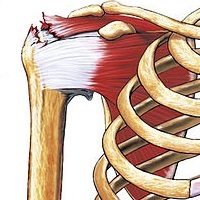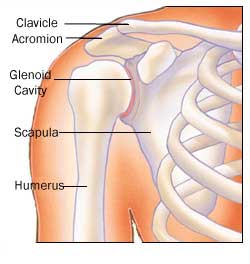Rotator cuff tear
(Redirected from Rotator cuff tears)
Injury to the shoulder's rotator cuff muscles or tendons
| Rotator cuff tear | |
|---|---|
| [[File:|250px|alt=|]] | |
| Synonyms | N/A |
| Pronounce | N/A |
| Field | Orthopedics |
| Symptoms | Shoulder pain, weakness, limited range of motion |
| Complications | Frozen shoulder, arthritis |
| Onset | |
| Duration | |
| Types | Partial tear, full-thickness tear |
| Causes | Acute injury, chronic overuse |
| Risks | Age, repetitive overhead activities, trauma |
| Diagnosis | Physical examination, imaging studies |
| Differential diagnosis | Shoulder impingement, bursitis, tendinitis |
| Prevention | Strengthening exercises, proper technique |
| Treatment | Physical therapy, medications, surgery |
| Medication | N/A |
| Prognosis | |
| Frequency | |
| Deaths | N/A |
A rotator cuff tear is a common injury involving the shoulder's rotator cuff muscles or tendons. The rotator cuff is a group of four muscles and their associated tendons that stabilize the shoulder and allow for its wide range of motion.
Anatomy
The rotator cuff consists of the supraspinatus, infraspinatus, teres minor, and subscapularis muscles. These muscles originate from the scapula and attach to the humerus, forming a cuff around the shoulder joint.
Types
Rotator cuff tears can be classified into two main types:
- Partial tear: This type of tear damages the soft tissue but does not completely sever it.
- Full-thickness tear: This type of tear is more severe and involves a complete rupture of the tendon.
Causes
Rotator cuff tears can result from:
- Acute injury: Sudden trauma, such as falling on an outstretched arm.
- Chronic overuse: Repetitive overhead activities, common in sports like baseball and tennis, or occupations such as painting and carpentry.
Risk Factors
Several factors can increase the risk of developing a rotator cuff tear:
- Age: The risk increases with age due to wear and tear.
- Repetitive overhead activities: Sports and jobs that involve frequent overhead motions.
- Trauma: Direct injury to the shoulder.
Symptoms
Common symptoms of a rotator cuff tear include:
- Shoulder pain, especially at night
- Weakness in the shoulder
- Limited range of motion
Diagnosis
Diagnosis typically involves:
- Physical examination: Assessing pain, range of motion, and strength.
- Imaging studies: X-rays, ultrasound, or MRI to visualize the tear.
Differential Diagnosis
Conditions that may present similarly include:
Treatment
Treatment options vary based on the severity of the tear:
- Non-surgical: Physical therapy, medications such as NSAIDs, and corticosteroid injections.
- Surgical: Arthroscopic surgery or open repair for severe cases.
Prevention
Preventive measures include:
- Strengthening exercises: Focused on the rotator cuff and shoulder muscles.
- Proper technique: In sports and occupational activities to avoid overuse injuries.
Complications
Potential complications from a rotator cuff tear include:
- Frozen shoulder (adhesive capsulitis)
- Arthritis in the shoulder joint
See Also
References
Transform your life with W8MD's budget GLP-1 injections from $125.
W8MD offers a medical weight loss program to lose weight in Philadelphia. Our physician-supervised medical weight loss provides:
- Most insurances accepted or discounted self-pay rates. We will obtain insurance prior authorizations if needed.
- Generic GLP1 weight loss injections from $125 for the starting dose.
- Also offer prescription weight loss medications including Phentermine, Qsymia, Diethylpropion, Contrave etc.
NYC weight loss doctor appointments
Start your NYC weight loss journey today at our NYC medical weight loss and Philadelphia medical weight loss clinics.
- Call 718-946-5500 to lose weight in NYC or for medical weight loss in Philadelphia 215-676-2334.
- Tags:NYC medical weight loss, Philadelphia lose weight Zepbound NYC, Budget GLP1 weight loss injections, Wegovy Philadelphia, Wegovy NYC, Philadelphia medical weight loss, Brookly weight loss and Wegovy NYC
|
WikiMD's Wellness Encyclopedia |
| Let Food Be Thy Medicine Medicine Thy Food - Hippocrates |
Medical Disclaimer: WikiMD is not a substitute for professional medical advice. The information on WikiMD is provided as an information resource only, may be incorrect, outdated or misleading, and is not to be used or relied on for any diagnostic or treatment purposes. Please consult your health care provider before making any healthcare decisions or for guidance about a specific medical condition. WikiMD expressly disclaims responsibility, and shall have no liability, for any damages, loss, injury, or liability whatsoever suffered as a result of your reliance on the information contained in this site. By visiting this site you agree to the foregoing terms and conditions, which may from time to time be changed or supplemented by WikiMD. If you do not agree to the foregoing terms and conditions, you should not enter or use this site. See full disclaimer.
Credits:Most images are courtesy of Wikimedia commons, and templates, categories Wikipedia, licensed under CC BY SA or similar.
Translate this page: - East Asian
中文,
日本,
한국어,
South Asian
हिन्दी,
தமிழ்,
తెలుగు,
Urdu,
ಕನ್ನಡ,
Southeast Asian
Indonesian,
Vietnamese,
Thai,
မြန်မာဘာသာ,
বাংলা
European
español,
Deutsch,
français,
Greek,
português do Brasil,
polski,
română,
русский,
Nederlands,
norsk,
svenska,
suomi,
Italian
Middle Eastern & African
عربى,
Turkish,
Persian,
Hebrew,
Afrikaans,
isiZulu,
Kiswahili,
Other
Bulgarian,
Hungarian,
Czech,
Swedish,
മലയാളം,
मराठी,
ਪੰਜਾਬੀ,
ગુજરાતી,
Portuguese,
Ukrainian
Contributors: Prab R. Tumpati, MD





